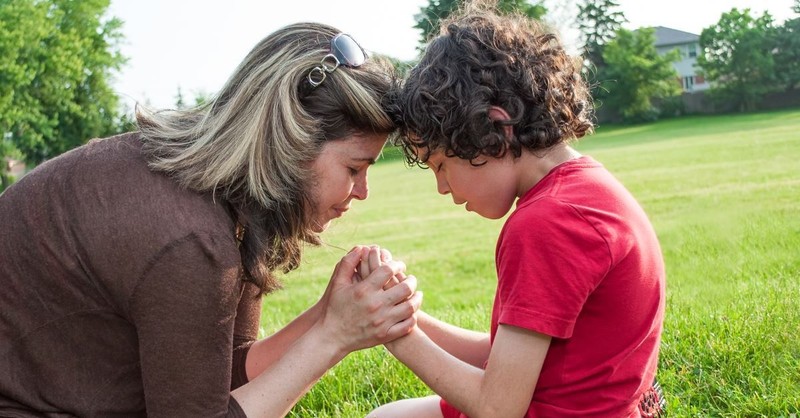
I live in the southern United States where people pride themselves on being "raised right," as Ferrol Sams says.
This “raised right” concept often comes with the perception of being right with God: if you’re doing all the culturally approved things, then you must be going to heaven.
Although it may be more obvious in the south, our entire western culture has adopted the belief that good behavior equals a right standing with God. We want our children to have a strong moral compass, however, teaching our children to be moral people apart from what Jesus has done for them puts the weight of redemption on their shoulders.
Here are 10 common ways parents mistakenly teach their children morals instead of the gospel.
Photo Credit: GettyImages/FlamingoImages

1. Emphasizing What Other People Think of Them
Once, my daughter screamed throughout the grocery store because she was not getting her way. I corrected her by pointing out that everyone was looking at her.
Recalling the incident later, however, I realized that it didn't matter what the other people thought of my daughter; it only mattered what God thought of her.
When we emphasize behavior based on what other people think of us instead of what God thinks of us, we teach morals over the gospel.
This is hard not to do. We want to look good to others, in society and in our peer groups. However, Galatians 1:10 warns us that pleasing man does not make us servants of Jesus.
Photo Credit: GettyImages/bowdenimages

2. Emphasizing Personal Gain
Growing up, my parents often said, "If you put your mind to it, you can be whatever you want to be.” Many people have this belief. We expect personal accomplishments, accolades, and material wealth for the work we do. We feel entitled to it and judge people when they’re not successful. This approach is an example of Moralism.
In the Gospels, Jesus does not call us to work hard for personal gain. Instead, He calls us to work hard so that we can serve others in love like He did.
Photo Credit: GettyImages/VikaRayu

3. Letting Them Think that Everyone Goes to Heaven
A few years ago, someone in our family passed away. My daughters asked me if she was in heaven. Because I had never heard the woman talk about Jesus, heard her testimony, or seen any indication that she was a believer, I told my daughters that I hoped so, but that I just didn't know.
This is a hard conversation to have and a hard reality to digest. It is much easier to say, "Yes, of course she's in heaven."
However, that teaches children that the requirement for going to heaven is something other than the saving grace of faith in Jesus Christ.
Photo Credit: GettyImages/fizkes

4. Shying Away from the Hard Parts of the Bible
The fear of talking about death, persecution, and evil is a problem with some children's Bibles, and in many homes too. The central theme of the Bible, however, is death and redemption.
From the garden of Eden (when death entered the world physically and spiritually) to Revelation (when Jesus returns to earth), death is present.
When we avoid these hard topics, we romanticize the Bible. It becomes a book of feel-good stories with happy endings.
Understanding our need for a Savior comes from understanding that death, persecution, and evil are real and that there is no redemption apart from Jesus. Teaching children that “in this world we will have trouble” (John 16:33) gives us a framework for teaching them about God’s strength and provision in the midst of our suffering.
Photo Credit: unsplash/josh-applegate

5. Avoiding the Words "Sin" and "Sinner"
I remember the first time I used the word “sin” with my children. Coming from my mouth, it sounded abrupt and harsh. But understanding the concept of “sin” is crucial to understanding the good news of Jesus.
I think there is a fear that using these words will hurt children's self-esteem. But I’ve come to believe that using these words preserves their self-esteem.
Children intuitively know that “what I want to do I do not do” as Paul talks about in Romans 7:15. They may not be able to label themselves as “sinners,” but they know they can’t do the right thing all the time.
Not talking about sin doesn’t make the fact that they’re sinners any less true. When we don’t talk about Jesus’ grace in light of our sin, it’s as if we’re keeping the key to the vault of their hearts a secret. Without that, all children can turn to is a “try better” attitude instead of resting in Jesus’ grace.
Photo Credit: pixabay/rene-rauschenberger

6. Focusing on Their Self-Esteem Instead of Their Identity
Another comment I often heard growing up was "No one is going to love you until you love yourself." But don’t we already love ourselves? Even a lack of self-esteem is an internal focus on ourselves and a way to deal with feelings of misplaced identity.
When we focus on self-esteem, we say to children that they must do something to feel good about themselves. However, there’s nothing they must do to be accepted.
They are accepted and loved because they have their identity in Christ and are made fearfully and wonderfully in His image. We can focus on identity by asking the question, “Who are you in God’s eyes?” rather than “Who are you in your own eyes?”
Photo Credit: Thinkstock/monkeybusinessimages

7. Focusing on Their Behavior Instead of Their Hearts
Whenever my children disobey, I try to ask myself, “What is in their hearts that led to this behavior? Are there lies they believe about themselves? Is there resentment or anger that needs to be dealt with? Do they feel anxious?”
Focusing on heart issues and not just behavior allows me to lead my children to a place of relying on God’s help to change them. This, not behavior modification, produces true righteousness.
Photo Credit: Thinkstock

8. Teaching Them that God Blesses Us Materially When We Obey
The Bible makes it clear that obedience leads to blessings (Luke 11:28). However, blessings are not always health, wealth, and prosperity. Blessing from God refers to a right standing with Him which brings peace and joy.
Teaching children to focus on material blessings may transfer the idea that they can manipulate God in a way: they obey to get something in return.
The goal is for our children to reach a place where they obey because of what Jesus has already done, not to get things from Him.
Photo Credit: GettyImages/yelo34

9. Emphasizing Cultural Traditions over Biblical Truth
Childhood is a time of innocence and make-believe. However, when we overly emphasize cultural traditions like Santa Claus over biblical truth, we set our children up to not fully grasp the gospel.
When we dissect the tradition of Santa Claus, we see that it is moralism at its finest: children receiving gifts or coal based on their performance during the year.
As a contrast, the truth of the gospel and the story of baby Jesus show us that we get the greatest gift anyone could ever receive—eternal life with God—from a Savior who is very real. And the best part? We don’t have to do anything to receive His gift. We need only accept it to know Him as our Lord and Father.
There’s a proper place for childhood imagination, but it’s important that it doesn’t shift the focus from the gift of the gospel to our children’s moral performance.
Photo Credit: pixabay/jill-wellington

10. Focusing on Their Accomplishments Instead of God's
Even adults struggle with giving God the glory for their success. In a “look at me” society in which social media gives us a platform to show off our community service, family highlights, church participation, and career accomplishments, it’s hard to not become focused on all we have done instead of all God has done through us.
When our children flourish in a certain area, it’s important that we point them to God, teaching them to give Him the glory for equipping their bodies and minds for His glory.
God knows that good morals cannot save us because no matter how morally we behave, we are still sinful at heart (Jeremiah 17:9). Morality alone can never lead to righteousness (Romans 10:4).
This is where the gospel comes in (Galatians 3:24). The place to start when teaching children the saving grace of the gospel of Jesus is to emphasize what Jesus has done before emphasizing what we must do.
Beginning with Jesus instead of ourselves puts the purpose of morality in its place. Life and standing with God are not found in what we can gain from our good behavior, but what we have already received through Jesus Christ.
 Brenda Rodgers considers herself a “recovering single” after years as a single woman chasing after marriage instead of chasing after Jesus. Now her passion is to mentor young women to live purposefully and grow in their relationship with God and others. Brenda has been married for five years to a heart transplant hero and is the mom of a toddler girl miracle. She is also the author of the eBook Fall for Him: 25 Challenges from a Recovering Single. You can also read more on Brenda’s blog, www.TripleBraidedLife.com and follow her on Twitter and Facebook.
Brenda Rodgers considers herself a “recovering single” after years as a single woman chasing after marriage instead of chasing after Jesus. Now her passion is to mentor young women to live purposefully and grow in their relationship with God and others. Brenda has been married for five years to a heart transplant hero and is the mom of a toddler girl miracle. She is also the author of the eBook Fall for Him: 25 Challenges from a Recovering Single. You can also read more on Brenda’s blog, www.TripleBraidedLife.com and follow her on Twitter and Facebook.
Photo Credit: Thinkstock
Originally published Tuesday, 16 April 2019.



